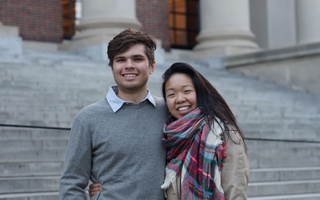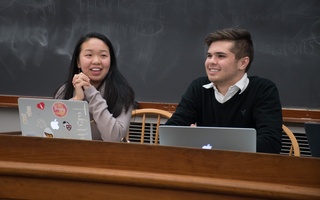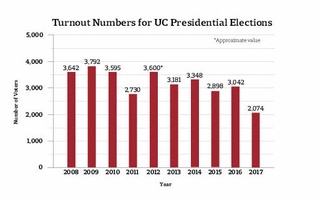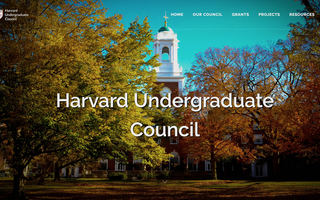{shortcode-9c5e4f09e5bb54f0eb9d1df597067ee5a177b1db}In an at-times contentious debate Sunday evening, the three tickets vying to become the next leaders of the Undergraduate Council sparred over policies outlined in their respective platforms and discussed the College’s sanctions against single-gender social groups.
The fourth annual “Crimson Crossfire” debate—hosted by The Crimson—took place Sunday evening in Harvard Hall between this year’s three tickets: Catherine L. Zhang ’19 and Nicholas D. Boucher ’19, Victor C. Agbafe ’19 and Michael K. Bervell ’19, and Conor Healy ’19 and Parth C. Thakker ’19.
Zhang and Boucher, the only ticket comprising two current UC representatives, stressed their promise to develop a more transparent and accountable leadership style through the introduction of online “progress bars” that would track the status of each of their 39 campaign promises.
“Specifically on the idea of transparency, that’s why we’re proposing that we will create progress bars for every single campaign promise we list so that you can hold us accountable for what we say,” Zhang said.
Agbafe and Bervell focused on their proposal to create a $250,000 social fund to help improve campus social life, though some attendees said they were skeptical about the candidates’ ability to fundraise that money. In response, Agbafe and Bervell suggested seeking external corporate and alumni sponsors.
In an exchange that quickly grew heated, Boucher said he was doubtful the UC could remain independent and apolitical if Agbafe and Bervell sought such sponsorships.
“When someone gives money they expect something... People expect big things,” Boucher said.
Bervell responded that he and Agbafe would stop the sponsorship if a corporate sponsor tried to inappropriately determine the use of money donated.
Healy and Thakker, by contrast, devoted much of the debate to changes they proposed to the UC’s administrative structure. The candidates hope to restructure both the representative election system and the process by which the UC selects students to serve on University committees.
“It’s borne out by the numbers that the Undergraduate Council does not represent the student population,” Healy said. “This structural change is inevitable and we want to do it hearing from students rather than letting the administration take that action years down the line.”
To start off the debate, moderators questioned candidates about the administration’s social group sanctions, which—starting with the Class of 2021—bar members of single-gender final clubs and Greek organizations from campus leadership positions, athletic team captaincies, and certain prestigious fellowships. The tickets varied in their stances on the social group policy.
Zhang and Boucher said that, though they do not support the sanctions in their current state, they broadly support administrative efforts to change the “status quo.” The other two tickets—Healy and Thakker, as well as Agbafe and Bervell—took an anti-penalties stance. Healy and Thakker called for an end to all administrative attempts to restrict undergraduate social life and were critical of College-sponsored parties.
Voting for the 2017 UC elections opens at noon on Monday, Nov. 13 and closes at noon on Thursday, Nov. 16.
—Staff writer Michael E. Xie can be reached at michael.xie@thecrimson.com. Follow him on Twitter @MichaelEXie1.
Read more in News
Smith Urges Students to Carefully Weigh UC ReferendaRecommended Articles
-
In Support of the Zhang-Boucher TicketWe believe the Zhang-Boucher ticket brings the experience, accountability, and transparency necessary to best serve and represent the undergraduate community.
-
 New UC Leaders Say They Are Getting Started ‘Right Away’
New UC Leaders Say They Are Getting Started ‘Right Away’ -
 UC President and Vice President Optimistic for Upcoming Year
UC President and Vice President Optimistic for Upcoming Year -
 Within and Without, UC Struggles for Student Engagement
Within and Without, UC Struggles for Student Engagement -
 UC Debuts Revamped Website
UC Debuts Revamped Website













